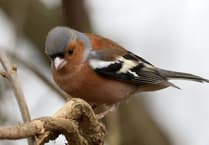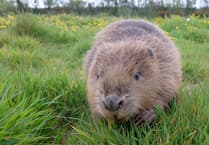
Do you fancy becoming a “nature detective” to help nature conservationists?
The wildlife charity People’s Trust for Endangered Species (PTES) is asking nature-loving volunteers to search gardens, parks and other urban green spaces for wild mammals and recording their findings online.
The details are needed for PTES’s annual Living with Mammals survey, which helps conservationists track changes in wild mammal populations, from bats and badgers to wood mice and weasels, and crucially, identify those that need the most urgent support.
Taking part is simple: just spend a little time in a local green space – it might be a garden or park, an allotment or churchyard – looking for wild mammals or the signs they leave behind such as footprints or droppings, and record it online.
The survey is open to everyone, with guides and information on recognising the different species you might see, so anyone can become an expert! Every record submitted to the survey’s website (ptes.org/lwm) is important.
David Wembridge, mammal surveys coordinator at PTES, said: “Historically we haven’t associated urban spaces with wildlife but that’s changing. It’s becoming more apparent that our towns and cities can be key strongholds for some species, such as hedgehogs, and we need people to tell us who their wild neighbours are if we want to support and protect these species.
“Taking part in Living with Mammals is a great way to reconnect with the nature on your doorstep and helps build a nationwide picture of the ‘green-health’ of urban spaces and the role they play supporting wildlife.”
In 2024, over 700 sites were surveyed across the UK, with hedgehogs, grey squirrels, foxes, mice and bats being recorded most often. Rarer sightings, including weasels, stoats, polecats and red squirrels were also recorded in England.
Last year’s data also showed rabbit numbers continue to fall, with only around one in ten sites recording sightings or signs or rabbits. The average proportion of sites with rabbits present in the last three years is 40 per cent less than that just five years ago, echoing the ongoing decline seen in the rural landscape.
The PTES has also recommended ways everyone can encourage urban wildlife without needing lots of space, time and money: planting grass lawns, not artificial turf; encouraging invertebrates by keeping potted plants on balconies; providing water in shallow dishes all year round; planting night-scented flowers such as mint or jasmine to attract moths and bats; and removing litter from local parks that could harm wildlife.
For more advice and to take part in Living with Mammals, visit ptes.org/lwm
Surrey Day
Surrey Day – the annual celebration of our county – returns for a seventh year on Saturday 10 May. This community initiative is organised by Visit Surrey, alongside partners BBC Radio Surrey and the Surrey Lieutenancy, with support from many local organisations.
There will be all-day coverage on BBC Radio Surrey from sites across the county, and the day’s activities will conclude with the lighting of a ceremonial beacon.
This year's lead theme is “How World War Two Shaped Surrey”, to coincide with the 80th anniversary of Victory in Europe (VE) Day.
The secondary theme is “Take The Lead for Surrey Day’: Visit Surrey will be sharing favourite dog walks and dog-friendly destinations so our four-legged friends can also play their part in the Surrey Day 2025 celebrations.
For more details visit www.visitsurrey.com/whats-on/surrey-day



.jpeg?width=209&height=140&crop=209:145,smart&quality=75)

Comments
This article has no comments yet. Be the first to leave a comment.